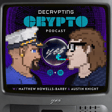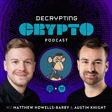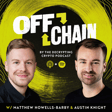Become a Creator today!Start creating today - Share your story with the world!
Start for free
00:00:00
00:00:01

Ordinals, Runes, and $DOG to the Moon w/ Leonidas
We host Leonidas, the founder of Ord.io, creator of the Runestone Ordinals project, and overall mega-bull on Runes. We discuss the future of Runes, Ordinals and Bitcoin L2s. Don't miss this one.
Transcript
Introduction of Leonidas and ORD.io
00:00:12
Speaker
Hello and welcome to the Decrypting Crypto Podcast. I'm Matthew Housebarbie, and we have a wonderful interview with Leonidas today. um If you are not familiar with the work of Leonidas, he is the founder of ORD.io, and most notably, he's the creator of the Runestone project. And that is what the highly popular meme coin that sits on Bitcoin dog is is a part of. This was a super interesting ah discussion that we had.
The Appeal of Ordinals in Crypto
00:00:48
Speaker
We talked a lot about why Ordinals has captured the attention of the the wider crypto community
00:00:56
Speaker
We dug in quite a bit actually into runes and what the future holds for for runes, some upcoming threats potentially, but what also the catalysts here could be. And we also bounced around kind of Bitcoin layer twos and how they might play a role in the wider ecosystem. So if you've been a fan of some of our previous episodes where we've been talking a lot about runes and ordinals and you know just expanding the use case of Bitcoin, I think you are going to absolutely love this one. So let's jump straight into the interview with Leonidas now.
00:01:40
Speaker
Leonhard, it's great to have you on the show. Really been loving a lot of stuff that not only you've been shipping over the past 18, 24 months, but also just a lot of the commentary that you share on Twitter in particular. If I'm ever feeling bearish, which is rare, I hop into your Twitter feed and it gets me feeling bullish again. I feel like I feel like... ti tier tier one ah hype man, ah which is which is great. and And I need that each day. um Well, listen, what why don't we just kind
Leonidas' Journey into Ordinals
00:02:14
Speaker
of start, right? Because i I was trying to think about this earlier today when I was thinking about some of the things I'd love to for us to chat about. Back in Feb, 2023, when I kind of first
00:02:29
Speaker
um dived into the ordinal space and I'm pretty sure it was probably from something that you posted on on twitter at the time and i think some of the guys from forgotten ruins back in the days of of operating through spreadsheets and it seems like you have just been a ah massive. kind of champion of of the ordinal space as a whole um through kind of the bear times and now getting into much more excitement, bullish kind of market conditions overall, at least certainly compared to last year. So I just wanted to understand like why
00:03:07
Speaker
Why, first of all, did did you just like find that this space, that ordinals in particular kind of captured your attention and why you got like really to the point of doubling down as much as you did early, early on? And why do you think then it's now, especially I would say in the past nine months, has captured so much of the wider crypto community's attention?
NFTs on Bitcoin and Bitcoin's Evolving Role
00:03:33
Speaker
It's a great question. I think the answer boils down to one thing and that is Bitcoin. Like to me, ordinals represented
00:03:45
Speaker
Ordinals represented bringing NFTs to Bitcoin, right? Like, at its core, that is what ordinals is. And Bitcoin was always something that I revered, right? So, for the people who've been in this space for a long time, like yourself, like me, like, you know, Bitcoin means something. Like, I can remember when there was no Ethereum. And Bitcoin was everything. It was the center of orbit. It was the end all, be all. It was the future. And then the future kind of shifted away from Bitcoin. The future looked more like dApps and NFTs and DeFi. And it wasn't happening on Bitcoin. And the idea of all of that coming to Bitcoin felt like the biggest thing that could possibly happen in crypto. Take the world's largest blockchain that has one single use case.
00:04:29
Speaker
and bring NFTs, bring meme coins to that blockchain. The opportunity size was very self-explanatory and the the opportunity was very clear. And you just had to get over this hump of, okay, in most people's heads, Bitcoin does not equal NFTs and meme coins. So we have to basically flip a switch and everyone said that you can now do NFTs and meme coins on Bitcoin. And that was the That was the thesis. It's always been the thesis um that Bitcoin will have this point. you know I love that because I think for anyone that's looking at the space now and probably the next six months,
00:05:14
Speaker
I think kind of consensus right now is Bitcoin can and should do more.
Leonidas' Contrarian Stance on Bitcoin
00:05:20
Speaker
But go back to the first half of 2023, that was not the consensus. And that was a an extremely contrarian take. And that's why I found it so interesting. on your level of conviction at that moment in time, when everyone was not only saying, hey, like, you know, outside of the laser eye crowd that, that, you know, is, is frankly always going to be annoyed at stuff like this. There was a lot of people just kind of straight up saying, this is the dumbest thing ever. Right. And, and you were one of the loudest voices in the opposition of that.
00:05:59
Speaker
Yeah, so I've had this mental model for a while when I think of an L2, I think of it L1. It doesn't really matter how you brand these things. like It could be branded as the degen chain. It could be branded as the DeFi chain. It could be branded as the currency chain. It could be branded as whatever. like You could brand these blockchains, these cryptoeconomic systems, however you want. You could make it orange and call it a Bitcoin L2. You could make it blue and call it an Ethereum L2. It doesn't matter. These things are just cryptoeconomic systems.
00:06:34
Speaker
And you can essentially inherit the properties of any cryptoeconomic system and apply the security and decentralization and the mutability and all of these things to pretty much any application. It's an abstract, substrate technology that we have. And you can do pretty much anything on top of any cryptoeconomic system ah for the most part, but people just choose to create cultures on top of the cryptoeconomic systems that focus on certain areas.
Bitcoin's Cultural Influence and Innovation
00:07:01
Speaker
So this was never a technological problem. Okay, this was always Bitcoin had a culture of we call them laser eye maxis and people that essentially believe that all uses for blockchain other than currency and store of value in a single currency BTC was a scam. These things were not ethical things to be doing. And that culture dominated Bitcoin. So for that reason, people sort of had written Bitcoin off is it's never going to innovate. It's never going to bring these things over. And Casey Rotimore,
00:07:34
Speaker
figured out a way through what we call the meta protocols to do NFTs and meme coins on Bitcoin layer one and not go through this pretty crazy governance process on Bitcoin, which, let's be honest, you're not going to get the meme coin proposal through the Bitcoin governance process. So that's that's where we that's where we are now is is Casey kind of hacked the system and then we kind of skip through all the culture. and just got to do what we wanted to do on Bitcoin, which is trade me points and collect your books. Yeah. And I think, yeah, you tap into a really important point, which is, you know, this is kind of the social layer, right? Of of crypto. And it's still an extremely important one. It's probably where you kind of either accrue or don't create value in the assets that are built on top of it.
Value of Bitcoin's Block Space
00:08:25
Speaker
When it comes to that,
00:08:27
Speaker
There's been, so we had the first probably six months of the ordinals, kind of um the genesis of ordinals, so to speak, right? And I think, you know, where you stand on that, the very end of December, 2022 started January, 2023. I think there was the the very brief initial mania of like, you know, telegrams and discord groups in spreadsheets for the first maybe month and a half. And then things kind of flatlined for, I mean, probably a good...
00:09:00
Speaker
six to seven months. And then there was this kind of mania coming into Q3 all of a sudden. And that coincided with a real retracement in ETH ETFs, I would say in particular, kind of quote unquote blue chips and where we sit today, right? Even things like crypto punks, which have largely avoided the kind of the crazy falls that assets like board apes have faced are now really reaching new lows, at least like local lows from from from what we've seen since the last ah previous ball. Do you feel like Bitcoin's block space has a premium attached to it now and that over an extended period of time,
00:09:49
Speaker
it there's just inherently going to be more value in, I guess, the quote unquote blue chips of Bitcoin versus any other chain? Or do you think that there's still going to be a fight for for for what is like the the premium if we take NFTs to begin with across chains?
00:10:12
Speaker
There is, in my opinion, there is a cultural kind of premium to Bitcoin's box space in that I think the term Bitcoin, if you went around the world and told it to people, a lot of people would know what Bitcoin was or would at least have heard about it. It has good kind of brand recognition. It's kind of like Nike or something like this. And then Ethereum is like still to this day, not to us, but to a lot of people around the world, to normal people, it's kind of like a new startup or something. They don't fully understand it. They probably never even heard of it. And for that reason,
00:10:48
Speaker
I think long term Bitcoin just has a brand that it can apply to that block space and create a robust market around that block space. Now, historically, you know, the the true measure of the value of block space is the fee market on top of that block space, right? And Ethereum actually was the highest demand block space. And only in the past year or so have we pushed Bitcoin beyond Ethereum for maybe a few weeks at a time, and then it'll come down. But, you know, Bitcoin's box space has historically not been in very high demand. You know, maybe it's some peaks of bull runs. People have just been willing to pay a lot to send BTC back and forth. But when you don't have people competing to do DeFi and trade JPEGs, it turns out like you don't need to like to huddle Bitcoin. You don't need to be transferring whatever you like 10 years.
Ordinals and Runes: Phases and Comparisons
00:11:38
Speaker
So they weren't using the box space very much, even though they were deriving a lot of value, like literally trillions of dollars of value was stored there. Then just the activity didn't require transferring very often. And thus the block space wasn't in very high demand. Ethereum had all of this other activity that just drove the box space up, ah price up. And then, you know, Bitcoin has now got similar, not as. much activity for a newer ecosystem. But, we you know, we're doing 90 percent of the activity of Bitcoin is this ordinals and ruins activity now. So, you know, there is a there is a robust market for Bitcoin's fees. And since ordinals came out when fees were literally one to two sat per v-byte for the prior year, you know, they're now sitting at 30 sat per v-byte and we've sent them as high as a thousand sat per v-byte. So we've definitely increased demand for Bitcoin's block space. And I only anticipate this going up.
00:12:32
Speaker
So you mentioned there runes. we We haven't come on to runes just yet, but you launched a, I think very objectively, a successful ordinals project in the form of rune stones. And I would love for us to dig into that a little bit. But one thing before we do that, right, what that that's come out of that was really this, this seemed to be the precursor to the launch of runes. And we've covered this in, in detail on the podcast. So anyone listening, you can go back a a few weeks and dig into the runes episode. But what came out of that was you, you launched the dog, uh, rune, uh, formerly known as I guess, dog go to the moon, but it's, it's been kind of like with the rest of the runes market going through some like big
00:13:23
Speaker
ah Extreme levels of appreciation, I would say, if you average it out over the past kind of month. And I think it's captured the attention of the whole space right now, even though I would probably say, unlike ordinals, the there isn't consensus in the community right now that runes has longevity, right? And I think that's probably just a function of the amount of time that it's been live. So I would love to understand from your perspective, if we park just like the the phase one, I guess of ordinals, what is it about runes that got you most excited? And then why don't we dig in a little bit more into like the Runestone project and and what that was born out of?
00:14:07
Speaker
Okay. So it's this, it is literally the exact same thesis as ordinals. It's funny to me having gone through being contrarian with ordinals to it now being, you know, people are like, I'm so mad at myself for not being early to ordinals. You know, we get the same repeat with runes. It's just for fungible tokens. It's the same guy creating it, the same ecosystem behind it. And people are, you know, doubting rudes the same way they doubted ordinals. So I just, I find that funny. And of course, the thesis is Bitcoin is the longest running, largest, most secure, most decentralized, crypto-economic, economic system, right? And that system,
00:14:51
Speaker
has a bunch of very valuable properties that I just described. And when you inherit those properties, you take those properties and apply them to a currency like BTC, we know what happens. It is the strongest store of digital store of value ever created. It is the most valuable digital asset in crypto, accounting for more value than all other assets combined. right So we know that these properties make BTC very valuable. We want to take those properties and apply them to NFTs and apply them to fungible tokens as well. We believe we can also inherit those strong properties that make for great stores of value, longevity, and an asset is very important, right? so
00:15:33
Speaker
Fundamentally, that is at its core the belief that, okay, Ethereum is a third the size of Bitcoin, then NFTs on Bitcoin should be three times larger than they are on Ethereum, and meme coins on Bitcoin should be three times larger than they are on Ethereum. And this will take time, but I believe at scale this is what eventually plays out and there's almost a natural equilibrium. there Yeah. So why don't we dig in then to the, the Runestone project and and where you came and then, then I'd love to circle back a little bit around, around runes in particular, but why, you know, I think there was a lot of, uh, in the run up to the launch of runes, um we talked a bit about this on the podcast. There was, there was a lot of projects that were launching, competing for attention in the run up to, you know, the Bitcoin halving, uh, when, when the, the runes protocol launched.
00:16:27
Speaker
what What drove you to create kind of the Runestone project? Because as far as I'm aware, outside of of course you built or.io, you hadn't actually launched like an ordinal specific project um the prior to this. So why why the timing and and why the specific execution?
00:16:48
Speaker
So yeah, it's it's a great question.
Runestone Project Origins and Community Trust
00:16:51
Speaker
The initial inspiration was release rune stone, and then that's like a vehicle for dog. And the whole idea was let's start the runes protocol off with a very free and fair project and and an ethos that we can all be proud of to kick this off, right? So, you know, the ordinals protocol started off with Casey Rademore, making it free and open for anybody to go and scribe one of the first ordinals, you know, this first 100 ordinals are worth
00:17:22
Speaker
you know, multiple Bitcoin each now. Anybody could just go and inscribe those themselves. He did not inscribe any more than just inscription zero. I thought that was like really cool. And I think it bootstrapped the entire ecosystem and everybody had this feeling of fairness. Okay. Then BRC20 came out with Domo. And then there was this 40 mint. It was free and open. There were many free and open mints. This was a great mechanic that Domo had created for BRC20. And then, you know, it's now a year later. I think that the ecosystem benefited a lot from the way those founders had created their protocols.
00:17:59
Speaker
and runes was coming out. And I could just tell that there was going to be a little bit of a different vibe on Ordinals where it wasn't necessarily gonna be, ah sorry, with runes, it wasn't necessarily gonna be free and fair. People were gonna pre-mine tokens a bunch and have huge team allocations and just do more traditionally what you do in other ecosystems. And what I had always liked about Bitcoin was that specifically for non-utility tokens, we had kind of rejected this idea that you deserve a team allocation. Like if something's not utility, literally, it means you do nothing, then you don't deserve the team allocation, right? This is just how a meme coin should be in my opinion. And I wanted to make sure that we started off runes with a free and fair project, and that is what Runestone was.
00:18:49
Speaker
And then that is what dog turned into DOG, right? So DOG was airdropped for free to the people who showed up in 2023 and participated in the Ordinals Protocol. These are the people who I believe deserved DOG and Runestone. And that is why they you know earned those tokens. And we've airdropped a lot of value to them now. And You know, it's something I think we can be very proud of. And there was no team allocation. I only got the same amount of, you know, dog and moonstone as other people. And I think it was a very special thing for the ecosystem to do. And I think it gave runes a good starting place and a good ethos to launch with. And I think to this day, when I go look at how people are minting their runes, I see that pre-mines are not popular. People just ignore the pre-mine.
00:19:40
Speaker
runes, they really just want to mint runes that don't have a pre-mine. Like, I would like to think Runestone played a little bit of a role in that culture. And I don't think we've seen a single ICO or presale of a rune today. um I'm sure it'll eventually happen. But the fact that, you know, on Solana, people are just tweeting addresses, sending $10 million dollars to it. And on Bitcoin, we don't have a single meme coin. ICO or presale to date and people are actually only minting things with no pre-mine. I think that's a testament to the culture that we have over here on Bitcoin and I think Runestone and DOG were intended to kind of help that culture to flourish.
00:20:17
Speaker
And I think it's also worth calling out something, an important piece that you you didn't mention is at the time of doing this, there was a pretty significant cost involved in being able to airdrop, you know, all of those. those those dog tokens to all of the different Runestone holders. um it's It's not like you know on Ethereum, quickly spinning up a a smart contract and you know blasting these out to to a bunch of addresses. There was a pretty significant outlay, you crowdsourced donations. i mean I watched this and it was it it was pretty it was pretty cool to see.
00:20:58
Speaker
It is expensive when you use Bitcoin L1, right? It's kind of like Ethereum L1, like it's it's expensive. So if you want to do the largest airdrop on Bitcoin ever, basically, right? If you don't count like the Bitcoin Cash Forks, you know, you're doing this massive on chain airdrop with you know, over a hundred thousand UTXOs and it just gets kind of gnarly. So, you know, we've spent over half a million dollars to basically execute this airdrop. And that is pure that a hundred percent of those those funds that were donated goes to cover network fees, right? Like the the engineers to help this out were just volunteers, right? There's companies that volunteered.
00:21:36
Speaker
um At the end of the day, it's just very expensive to use Bitcoin to do something like this. So, you know, at scale, air dropping to over 100,000 people, you know, we had to raise funds to make that happen and to cover those network fees that there was really no way to get around. And and in that process, we did end up inscribing, you know, the the largest ordinal inscription ever at the time and buying the largest Bitcoin block ever, which is pretty cool. Yeah. Working with that marathon and
Bitcoin Layer Twos and Ecosystem Enhancements
00:22:02
Speaker
ordinal spot to do that. so You know, it was definitely a very fun, it was a very fun time and I'm just extremely, I think the entire dog and runestone and ordinals communities and runes communities are very appreciative to the donor to, you know, helping that possible.
00:22:16
Speaker
and And you mentioned the fact that Bitcoin, layer one and, you know, doing, doing this stuff on the layer one itself is incredibly expensive. It's, you know, it's, it's not as flexible as smart contract based blockchains like ETH and, and Solon otherwise. Right. So, and this is why. it's required more of, um well, I mean, it required the kind of ordinal theory and and protocol that that we're using today to make this happen, as well as, you know, a bunch of prior tech innovations that that we chatted about previously on the podcast around Tapra, et cetera. But there's something that is a narrative that's running alongside runes and ordinals. And I firmly believe that
00:23:03
Speaker
ordinals kind of delivered product market fit or at least the social consensus to to pave the way for this, which is Bitcoin layer twos. And I'm interested to get your take on the the various iterations of upcoming layer twos, whether that be you know side chains or or otherwise. so But how you also think this is going to play into the the wider ordinals narrative, because I think if if you were to if we would step back objectively and say, you know, what what could potentially be a threat to runes? And that's maybe, um you know, let's say meme coins or other tokens that exist on the Bitcoin layer two, creating their own kind of ecosystem.
00:23:50
Speaker
the other side of that could be like, well, okay, I mean, if you take Ethereum, the layer one meme coins do much better than, you know, those on base or arbitrum or what else. But I'd love to, I'd love to get your take and opinion on layer twos as a whole in the Bitcoin ecosystem. And what do you think that means for the ordinals kind of space as a whole? Yeah, it's a great question. I think L2s are really exciting on Bitcoin because you're not only getting the scalability, but you're also getting a lot of functionality. You get smart contracts. You can do liquidity pools, all sorts of fun stuff that we're used to in other ecosystems. So L2s, like this is the one area we agree with the the laser eye maxis. We're not going to scale Bitcoin layer one. We're not going to increase the box size, right? We're going to scale with layers and there's consensus around that. So it's just a matter of building this.
00:24:43
Speaker
I think today there is no such thing as a Bitcoin L2 other than let the Lightning network. So these are essentially the things that call themselves L2s, they're basically just blockchains or side chains that kind of you know have an orange logo and brand themselves towards Bitcoin, but really don't have a relationship with Bitcoin L1. They're not inheriting the decentralization and security of Bitcoin L1 in any meaningful way. And we need this upgrade that you know a lot of people are excited about called Opcat that will basically allow for the trustless bridging of assets between Bitcoin L1 and L2. Otherwise, it's really no different to just bridge your assets to something like Solana. If Solana just branded itself as a bit Bitcoin L2, I think technically that would be very
00:25:27
Speaker
similar to what the actual Bitcoin L2s are, right? So I think, you know, long-term, we need to go through the Bitcoin governance process and have a soft fork to add op-cat, at which point you will have trustless bridging to these L2s, and I think that'll be... a really powerful step towards us you know having a really robust L2 ecosystem where I think it would be much more legitimate to like you know compare RL2s to something like Ethereum's L2s. So that is sort of where the ecosystem's at. My guess would be 12 months probably, at least until something like Upcat gets approved. So this stuff does happen sort of slowly on Bitcoin, but that's obviously intentional. And then look, meme coins on the L2s being a threat to runes.
Future of Runes on Bitcoin's L2s
00:26:12
Speaker
I mean, it's totally possible. Like there are people doing meme coins on L2s today. I think so far from what I've seen, the kind of situation that it appears that this is going to happen, I could be totally wrong, but it appears that people create the assets on L1.
00:26:28
Speaker
and then bridge them to the L2s to do the fast trading, but ultimately want the foundation of the L1 for the the kind of provenance and security and decentralization of the asset. And then you can have the choice to trade it on the L2 and then bring it back to the L1 if you want to. But look, we're seeing the success of tokens like Brett on base, where the future is unclear. Like, I'm not going to try to be a fortune teller and pretend what everything looks like in 10 years. Maybe the value is in the L1 tokens, bridge to the L2s. Maybe there's this robust ecosystem of tons of tokens that are exclusive to a specific L1, sorry, a specific L2. So unclear how that all shakes out.
00:27:09
Speaker
But like I believe there's a pretty good chance that it's going to be a great experience to take these very valuable crypto assets that have been created on Ethereum and Bitcoin and to you know bridge those to L2s and trade them over time. And yet, you know, we'll see, like ultimately it's all very bullish for runes because you're basically just taking a rune, which is built on the UTXO model and you're moving it into an account model type situation where you can then do AMMs. So the user experience for runes will go up with the addition of Bitcoin L2s in the coming years.
00:27:43
Speaker
it does feel like that's gonna be one of the the big unlocks is, you know, I don't think a whole lot of people that are just coming into runes now kind of realize, you know, pretty much the kind of cumbersome experience or at least the very different experience that you get from trading runes versus what you would with, yeah, like a whatever an ERC 20 or any other token in an AMM, right? that's it's It's very different, right? And I think it's much better than the BRC-20 stage, for sure. um But it's still it's still very different. I think there's a lot of projects out there like Magikitum, for example, and others that are making this easier. It feels like every kind of a you know, funding round that i'm I'm seeing over the past kind of three months is teams building a runes decks. So I'm pretty sure it's going to be an explosion that that's happening there pretty soon. And that will help with all this. But I i wanted to kind of come back to one of your your comments near the start of the
00:28:46
Speaker
the the recording that we did, which was that when you touched on Bitcoin governance, and how difficult it is to make movements in governance, I feel like every, you know, two to three years, we have a major kind of governance decision, whether that be backing, you know, the the 2017 block space wars through to SegWid. And now we kind of sit in this really interesting piece of like this op cat discussion. And I ah what i'm What I'm hearing from you, and maybe you correct me if if this isn't the correct take, but it feels like you believe at least that this is the path forward that we need to go down. And it seems like, you know, we've had probably the likes of StarkNet as well, now being another big player, pushing this narrative alongside many other big proponents ah of it, but it is still a big hurdle to overcome to get that through governance. And on the other side, you've got, you know,
00:29:43
Speaker
bitvm you've got stacks and all these other like side chains that are L2s that are taking a slightly different path that are, whether we like it or not, are going to get some traction, whether it will last or not. It feels like this is like a a fork in the road right now, no pun intended, right around like Which direction this goes in do do you feel like these two things could coexist in in harmony or at the same time? Or do you think it's gonna be you know one or the other over the long term? right, so look if we If Bitcoin never gets upgraded again, I think that does spell trouble for the old twos. I think Bitcoin is
00:30:28
Speaker
Look, people can be very clever. BitVM is an extremely clever solution. I just don't think in practice this thing is even remotely a solution to our problems, right? So, fundamentally, people will just choose to use L2s on other chains and build on L2s on other chains. And like we just won't have L2s on Bitcoin if we can't get something like Opcat or just some sort of similar trustless bridging solution through the Bitcoin governance process. I think Yeah. To me, it's like a non-starter. Like it's, I'm seriously like asking myself the question. And I think this is like what most people are like, right? Like most people, like nobody's really using these L2s to be completely frank with you. Right. So, yeah you know, and the reason for that is, is that it's no different than bridging your, you know, rune or ordinal to like a centralized exchange or something. Right. Like there's the exact same trust assumptions. You know, it's, it's a trusted bridge. So like.
00:31:22
Speaker
It's not like an Ethereum L2, where it's like, You know, it it feels like there's somewhat of a decentralized aspect to these L2s. It's just not the case today. Like literally, you're just putting your your token in a multisig wallet controlled by a very small VC-backed team. And that's fine if that's what you want. I just don't think that's what most people want. So we really do need to have the upgrade. I think it would be problematic for sort of the narrative of Web3 coming to Bitcoin if we cannot eventually have real L2s on Bitcoin.
00:31:56
Speaker
Yeah. So let's, let's wrap things up. Um, and I would love to just briefly end here on kind of what's next for, I guess the wider Runestone
Future of DOG and Runestone
00:32:08
Speaker
project. I think dog today, even though the market has been kind of like pulling backs with. you know kind of Fed rate discussions being on the table. We're recording prior to to the the CPI print and otherwise, so maybe we we get some good news. But we're sitting at around about $600 million dollar market cap. I couldn't tell if it actually passed a billion, Leo, or whether it was like just on the precipice of that like a few weeks back. But you know it was in and around a billion and in in market cap.
00:32:41
Speaker
what's What's next for Dog and Runestone and what what are you most excited about?
00:32:48
Speaker
So unfortunately we did not cross a billion. We hit like 980 million. Saving it, saving it. We're saving it, exactly. We're saving it. I got ah i got a Twitter space with like 3000 people with reminders that for some point in the future for a party for that. But unfortunately we did not we did not hit. um Look, the future for Runestone and Dogbik, these are non utility tokens. So the future is like, a community of people memeing on the internet and we very much modeled like dog is really modeled after bitcoin right like the similarities you know it was very much intentional like there is no official dog twitter account or dog telegram group or dog website right like the the community is just a bunch of people a lot of them receive dog for free and then now a lot of people have bought in as well and they
00:33:38
Speaker
put out dog memes on the internet and you know somebody put dog in a video game yesterday somebody created ah this this fun little animation ah with dog yesterday it's like a little 30 seconds short so the community is going to go do its thing the same way the bitcoin community just took bitcoin and ran with it it just happens to be a meme coin so you know, very much um expect more of the same. Like it's just the community having fun with dog and proliferating dog to the rest of the world basically is the goal. So there is no, there is no roadmap of, of like us creating the future of finance with dog or us trying to, you know, put together the dog team that's going to go market this with KOLs. There's just none of that, right? There is literally no no dog spot ETF.
00:34:27
Speaker
I mean, I never said that. We don't know. We don't know the future holds. But no, I mean, look the reality is, the reality is like it's a true meme coin. It's not the corporate meme coin vibe. it's ah It's a real meme coin. And we're just going to keep memeing on the Internet the way I think meme coins are supposed to be. And I don't think you need to force utility onto everything in crypto. And I'm definitely going to try to make sure that we don't force utility on top of dog for no reason. That's great, and I'm sure is is likely music to to many holders is. Well, I'm sure a lot of our listeners, I certainly will be following everything. I am a a happy Runestone ecosystem participant, going to be following a lot of the stuff that that you're doing over over the next kind of year or two.
00:35:13
Speaker
um for For anyone listening, if you're interested, you want to explore Ordinal's RuneSpace, I will say that Leonidas is built like ord.io, so o-r-d-dot-i-o, which is an amazing resource. Great space to just explore the wider Ordinal's Rune ecosystem. Obviously, check out the Runestone project. And you you host a ah spaces on X as well, right? the Is it the Ordinal show that you you run? Yeah, so people should definitely check that one out. Well, listen, thank you so much for taking the time to to come on the show. We really appreciate it. And yeah, we'd love to have you on in a few months time and see where things have all met now. Thanks, Pat. It was an honor to be here.
00:36:20
Speaker
The contents of the Decrypting Crypto podcast should not be used and are not intended as investment advice. Please do your own due diligence before making any investment, cryptocurrency or otherwise.
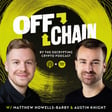
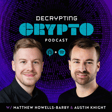
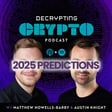
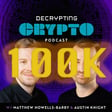
![CBDCs: The [Dark] Future of Money (Part 2 of 2) image](https://media.zencastr.com/cdn-cgi/image/width=112,quality=85/image-files/61fc0461fb20e00040aeb09e/5b9f1396-2a8e-418d-82a0-30fd00969266.jpg)

